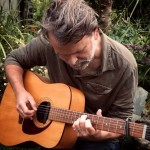 Dark Leaves is the one-man project of Patrick Aston, who lives near the coastal town of Penzance in Cornwall. On one EP and one album he has played a dark folk influenced by the geography of his home. In the following interview Patrick spoke in great detail about his career, influences and plans.
Dark Leaves is the one-man project of Patrick Aston, who lives near the coastal town of Penzance in Cornwall. On one EP and one album he has played a dark folk influenced by the geography of his home. In the following interview Patrick spoke in great detail about his career, influences and plans.
It seems that nowadays there is an ever-increasing number of terms to categorize music. On your bandcamp site you use the term alternative folk. Is that something you feel most comfortable with? To what extent would you say does alternative folk deviate from other types of folk music?
Alternative folk is a genre I’m very comfortable with. Inspiration for lyrics does still come from more traditional sources like folklore, pagan seasons, the sea and nature. I think that the alternative folk label provides artists with more scope to experiment with new sounds and song structures and move away from traditional sounds.
In a recent review my latest ep was described as Psych Folk, which is an area I’m currently exploring by introducing some more electronic sounds. I feel at home in the alternative / psych genres, and I still base everything around the acoustic guitar which is always where my songs start. The music always comes first for me and Lyrics second.
I love the fact that traditional and ancient folk music is still being played on original instruments. It’s so important that these songs are being maintained and passed on. This is a base line and constant reference to true folk music and storytelling.
I should mention that I have a guitar teacher, who sadly I haven’t seen since Covid hit, but who has significant impact on my music and playing. He’s an incredible Cornish guitarist and part of a wonderful band who play original folk music using ancient instruments. They’re called Bagas Degol and work with a brilliant storyteller to perform incredible narrated live shows.
Having a guitar teacher or mentor, stretches me and provides a sounding board for my new songs. It’s good to get other people’s views when working as a solo artist. He has also shown me how allowing space and gaps in guitar playing can add value to songs. Subtractive techniques and removing clutter can be a great way to experiment. I’m doing that now, much less busy riffs and picking style etc.
Do you feel an affinity to other artists making music now? Can you relate to Sharron Kraus, Trappist Afterland or Shirley Collins, the “secret queen of England“ (as David Tibet once put it)?
I relate to all 3 of those great artists. Maybe Shirly Collins is a little too traditional folk for me, but I still have the utmost respect for her. I saw her play at Greenman Festival, and she was amazing. Sharron Kraus is an artist I’ve only just discovered (I’m very ashamed to say!). I love all her work and especially her music with Gillian Chadwick under the name of Rusalnaia. Both Rusalnaia albums are excellent and are very inspirational for me. Adam [from Trappist Afterland] gave me the chance to support Trappist after land playing live in Cornwall last year. It was a very special gig for me and so lovely to meet Adam. We keep in touch and I love his music. Other artists I’m listening to right now and feel an infinity to, or am drawing on for inspiration, are Espers, Six Organs of Admittance, Ilyas Ahmed, Seabuckthorn, Arborea and Arbouretum.
You live in Penzance. What role do the town and the region play for you? Are your music and your lyrics influenced by the psychogeography of the place and of the folklore?
We’re about 20 minutes from Penzance and live in a tiny place called Tresowes Hill, in a remote area, about a mile from the sea as the crow flies. Cornwall is my home and was always calling me back. I knew one day I’d return. It’s a very special place. There’s a big artist and folk community here with lots of extremely talented and lovely people who draw on the magic that’s all around; in the raging sea, the beaches, the hedges, in the massive skies and in the cliffs and headlands…whatever the weather and so yes, I do relate to the term psychogeography, very much. The music I’m writing right now, for my second album, is inspired by all of those things and I’m excited to be back here to draw on those influences.
Would you say that there is a tension between the rural and the urban?
From the perspective of living in Cornwall, any tension between the two is more obvious in the holiday season. The population doubles for weeks on end with holiday makers. Whilst the tourism trade is important, our infrastructure often cannot cope with the extra demand. The other issue is that houses are being bought by people who don’t live here, for use as second homes and are only occupied for a small number of weeks each year. This is killing communities.
Musically, there have been some incredible bands inspired by city life and urban living. Bands like Radiohead and Interpol for example. Folklore exists everywhere, it’s not reserved for the countryside and folk music alone. I think Drenge’s epic song ‘Running Wild’ is a brilliant modern folk song. I’d like to cover it one day…
This is closely connected to the preceding questions. It seems that nature plays an important role in your music. I’m thinking of the bird and the tree on the cover of “Grey Stone in the Wood“ and the trees with their intermingling roots on your latest EP and your lyrics are also characterized by references to the natural world. Can you tell us a bit about your relationship to nature?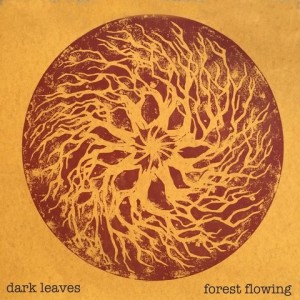
Nature plays a huge role in my song writing. I don’t think my album would have been written without being able to walk through the forest or sit under a Yew Tree and close my eyes to listen to the sounds around me. There’s a song on the album called ‘The Hidden’ which was conceived in exactly that place! I created that image on the album cover from my own photos. I really wanted an image that would set the scene for what listeners would find on the album and I think I managed it.
My inspiration comes from nature, the folk lore of forests and of the sea and from closely following the pagan seasonal festivals. I feel connected to them. I try to keep my home recording as simple and as natural as possible. I don’t stress too much about the technical side of things so that the connection to nature and natural sound is maintained. I love the recording space I have in the house. It complements the vibe I try to create and provides me with exactly what I need.
Half the songs on my album were recorded on an iPad using Garage Band. Since then, I’ve invested in a really good microphone, Logic Pro and a MacBook. I use minimal effects on the guitars. There’s no soundproofing in my room so if you listen to the spaces in the tracks you can hear birdsong in the background. That doesn’t bother me at all, in fact it only adds to the atmosphere on the quieter tracks.
I’ve recently bought myself a digital field recorder and am planning to use natural sounds and capture vibes from places of unique and special interest as soundscapes in my music. Probably on a few tracks on my next album.
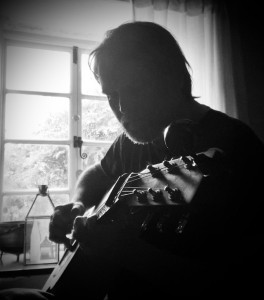 In your songs there is an often a certain element of darkness or of melancholy. Is that the way you see the world?
In your songs there is an often a certain element of darkness or of melancholy. Is that the way you see the world?
Ha ha! Not at all. That’s just what naturally flows from me when I’m playing and writing. I strongly suspect it was years of listening to The Cure! The subject matter of my songs and musical roots always lead me towards the melancholic / atmospheric production. I do like to immerse myself in folklore when I’m writing, and you can see that coming through in my Instagram posts and those who I follow on social media.
I do kind of have a double life between my day job and then my song writing which is a completely different side altogether! It has always been hard for me switching from one to the other but the Covid lockdown has helped as I’m working from home now and have a much better work/life/music balance.
In the last years the term folk horror has become increasingly popular (especially when talking about movies and literature) and is name checked quite frequently. Do you feel any affinity to that (however fuzzy the term sometimes seems to be)?
Yes, I do, and I love all those old 70s horror films. I grew up in the 70s with haunting children’s programmes that pushed the boundaries. The Owl Service and, in particular, Children of the Stones which has stayed with me all these years. It’s available to stream on YouTube now. I watched the first episode a while back and it still stands up as a really creepy and atmospheric series. That whole feeling is part of the music I write, and I hope it evokes those feeling in others too.
I can recommend a great book called ‘A Year In The Country’ which explores folk horror culture and is a great source for exploring folk horror roots. ‘Hauntology’, which is another alternative source of great inspiration, even if it’s just a feeling or a thought process that gets stirred. Hauntology and the related electronic music scene, centre around nostalgia and uses that to form an alternative vision of a Britain remembered differently, which nicely moves into the next question!
Can you tell us about the influence of the fictional Hookland on you and your work?
For me, the lost county of Hookland is an escape to a place where myth and legend and folklore and an alternate, parallel Britain all meet to form a wonderful rich and endless source of inspiration through thought-provoking creative writing and social media content. The Hookland Twitter account is one of the only reasons I use Twitter. It’s a place where fellow Hooklanders can contribute or watch and enjoy as distant memories of places, things, music and folklore and myth are remembered differently and brought to life.
I feel like Hookland is always close by and just an altered memory away. It’s in the 200-year-old cottage we live in, at the foot of Tregonning Hill, it’s just around the corner or just over the hedge when I’m out walking the dogs at night. It’s in the fields, in the powerlines, in the cliffs and under the sea…
There’s a song that will be on my new album called ‘The king Tide’ which is 100% inspired by the Sea Lore of Hookland and ‘The King Under The Sea’. The legend that is the lovely David Southwell, a wonderful human, author and owner of the Hookland Twitter pages, wrote a fantastic poem for me that I’ve been able to adapt and use as lyrics for the song. I’m very proud of it and will dedicate it to David and Hookland in the album notes.
Currently, it seems inevitable not to ask about the impact of the coronavirus on one’s life. Has your music, recording, creative process been impacted by what is happening right now?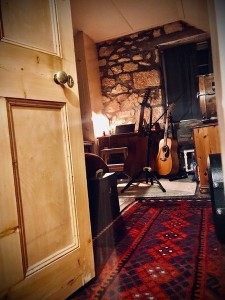
The primary impact on my life from Covid19 has been the change to working at home. The way things are now, I can’t see myself returning to an office at all to work. This has had a really positive impact on my wellbeing. I’ve been more productive and busier than I’ve ever been, sleeping more and spending more time around my family.
My guitars and recording gear are all right next to the desk I work from, so if I feel the urge to play, I can, and I do! I did go through a long period of time from April to about June where no new songs came through. Instead I focused on finishing tracks that were already started. It’s been a positive experience for me.
Your music does not seem to be overtly political but on your Instagram account you posted support for Black Lives Matter. Could you be imagining yourself a political song given the right occasion?
No, I won’t be writing a political song anytime soon. However, I do have strong political views, mainly based around equality and diversity. I’m on a learning journey around the whole BLM movement. I’ve realised that it’s not a fad, not just an Instagram post. Massive change needs to happen to get to a place where the lives of Black people, the LGBTQ community and disabled people are living in a more inclusive and respectful society.
In an Instagram post you mentioned that you used to be a goth and that you are/were a The Cure fan. Could you tell us a bit about your musical development (both as a listener and as somebody writing and recording music)?
I’ve always been a fan of lots of different genres. My earliest memory of buying my first vinyl comes from the late 70s / early 80s. I was a huge fan of The Police, especially their first 3 albums. I was also listening to American AOR & Metal, Reggae and New Wave and Punk and New Romantic. Hawkwind’s Sonic Attack, Faith by The Cure and various LPs from my Mum and Dad’s collection of 70’s folk and rock.
The first band I saw live was Orchestral Manoeuvres In The Dark, at the St Austell Coliseum in Cornwall, which was the only local large venue. I also saw The Cocteau Twins there which was a very special gig for me and my first introduction to the goth sound.
I joined my first band at 18, in the late eighties. We were called Yellow Van and started as an acoustic duo playing Bob Dylan and Pink Floyd covers in a pub. We started to write our own songs after recruiting a bassist and a drummer and played a sort of psyche / new wave style. After that, I joined a Goth band called Plague of Innocence as a guitarist. We were influenced by bands like The Cure and Play Dead.
I loved bands like My Bloody Valentine, Ride and Pale Saints. I lived with a friend that worked in a record store and he’d bring home new releases on a Friday for us to listen to. I was very lucky to have people around me with great music taste who were able to introduce me to lots of new bands.
I began to get into electronic music in the 90s too. I never really got into the dancing or the club scene, but I loved the music. Artists like Air Liquide, Beaumont Hannant, Plaid and Boards of Canada inspired me and in 1995 I wrote an Ambient Techno album under the name of Paranonia. I was lucky enough to be signed to a Belgian techno label called Nova Zembla, which was a subsidiary label of KK Records. I wrote and recorded the album in my own studio at home using an Atari and the first version of Cubase.
In 2008 an album was released that changed everything for me. Midlakes ‘The Trials of Van Occupanther’. It’s such a brilliant album. I was immediately hooked, and with Bon Iver releasing For Emma, Forever Ago, those two albums rekindled my love for acoustic music. Midlakes next album ‘The Courage of Others’ is another album I adore. I really benefitted from the guidance and experience of my guitar teacher. We shared a passion for acoustic folk, and I ended up learning and playing Nick Drake and John Martyn songs live at a couple of pubs as a result.
I didn’t start writing my own music again until 2016 and in 2018 I released the first Dark Leaves songs. These songs came naturally to me and are all influenced by my love of 70s folk and emerging new psych folk artists. The chord changes and minor keys are from my goth roots and the ambient drones and retro synth sounds from my electronic influences.
I’d like to finish by asking you about future plans, releases etc. Will there be a new album? Could you see yourself working and recording with other musicians?
I have a lot to thank the Reverb Worship label for. They heard me and offered to manufacturer and distribute my album on CD through the label. It was Grey Malkin of The Hare & The Moon that heard my music and referred Dark Leaves to them. Grey is a lovely chap and we often speak on social media. He’s very well respected in the folk horror scene and has collaborated with many other key artists in that genre, including Trappist Afterland. Their recent collaboration is fantastic. Reverb Worship have also just released a 2 track, lathe cut vinyl version of 2 tracks on my new ep a couple of months ago.
Whilst I was absolutely honoured to have a release on Reverb Worship, I’ve decided to 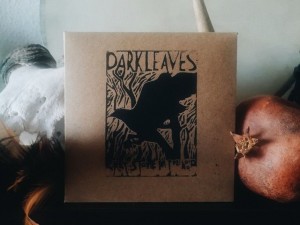 self-release future copies of the album. I’m now building and had-printing my own covers. The album continues to sell, and I’ve just made another batch for sale on my Bandcamp site. I release all my music on the streaming platforms too as I feel it’s important to have a presence there.
self-release future copies of the album. I’m now building and had-printing my own covers. The album continues to sell, and I’ve just made another batch for sale on my Bandcamp site. I release all my music on the streaming platforms too as I feel it’s important to have a presence there.
Next steps for me will be to finish my next album. That should be ready in the Wintertime and I’m really excited to share the songs. I plan to take a different approach for this release and am actively seeking a suitable label to release it.
I’d also like to release my previous album; ‘Grey Stone in the Wood’ and my 3-track ep ‘Forest Flowing’ (released in June), on vinyl, either self-released or through a label.
I would definitely work with other musicians and would love to play in a band with other people again someday. I’m also interested in collaborations, I’ve never done that before, but I think the technology available now makes it achievable. I’m thinking a first go at that might be to collaborate with a female singer for a couple of ideas I have for the new album. There are a couple of female singers that I think would be wonderful to record with…if only I had the courage to ask!
I’d like to do some more Dark Leaves gigs next year, with the new songs. I really enjoy playing live, but it can be daunting performing live on your own. Especially not being 100% sure that the sound is good. I’d benefit from some knowledge and expertise in that area, as I take my MacBook with me to play along with the backing tracks and I’m never too sure if the levels are right or the mix is good! It can be quite an edgy experience for someone who plays such chilled music!
Interview: MG
